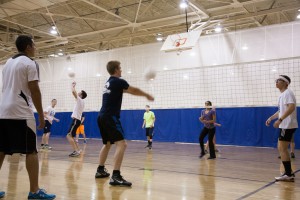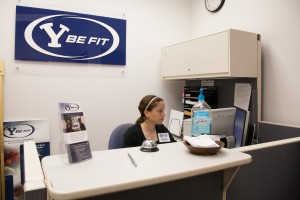The sun is shining, blossoms are blooming and students are sprawled out across the green grass studying. This can only mean one thing: it’s time to get ready for modest, one-piece swimsuit season.

After a long winter of indulging an ever-growing sweet tooth, students may start to realize they can no longer hide behind hoodies and zip-jackets. Here is a list of useful tips on how to get healthy and fit for summer:
Diet
“A common misconception among people is that if you exercise well you can eat all that you want,” said Rachelle Burrup, a co-director at Y-Be-Fit. “Diet plays a huge role in weight loss, more so than just exercise alone . . . so make sure you are getting your servings of fruits and vegetables.”
The Department of Agriculture recommends that males and females ages 19–30 get three cups of vegetables and two cups of fruit every day.
A great tip to get enough fruits and vegetables is to pre-load.
“Pre-loading is when you eat your fruits and vegetables before you eat the other things on your plate,” Burrup said. ” Filling yourself up with fruits and vegetables first will help you reduce your caloric intake because those are low-calorie foods.”
Another great tip to help students eat healthier is to plan ahead what they are going to eat. Dietitians are readily available on campus to help make a meal plan with anyone who is interested.

“It’s hard to eat healthy when you’re in the moment, having unhealthy cravings after a long day of studying, and you open up the cupboard to see what you have,” Burrup said. “Planning out your meals and already deciding what you will eat for the day is extremely important.”
David Fajardo, a BYU graduate who is now a personal trainer for Orange Theory Fitness in Las Vegas, recommended that students start small when starting a diet.
“Anyone who wants to start eating better should start small and perfect their diet as they go,” Fajardo said. “If someone is indulging in a really bad diet and they all of a sudden change everything 100 percent they will get burnt out. Start small; if you drink soda, stop that, master it and then move on. It will eventually snowball into a perfect diet.”
Exercise
When asked about tips for starting to exercise, Fajardo said, “Get a good, solid reason for starting to work out. If it’s just for aesthetic reasons people usually will not last. Find a good reason, and make it a habit that will last the rest of your life.”
BYU has the privilege of being close to many outdoor attractions. Rock Canyon, Provo Canyon, Utah Lake and bike trails throughout Utah County are some of the places students can get out, move and have fun.
“I think it’s a sad thing that most people live such sedentary lives,” Fajardo said. “I endorse being outdoors and finding something that will keep you healthy. The weight room is not for everyone; find what works for you.”
BYU also offers student activity classes for anyone wanting to learn a new sport. From basketball to skiing, BYU offers a variety of sports to learn and participate in.
Steven Alexander is a junior at BYU studying public health. He has taken several student activity classes and seen results from them.
“I lost weight, and the classes gave me motivation to live a healthier lifestyle,” he said.
Sleep
This third area for getting fit is often overlooked by students. A crucial part of being healthy is sleep.
“Never, ever sacrifice sleep,” Fajardo said. “Sleep needs to be as high of a priority as diet and exercise.”
The National Sleep Foundation recommends that healthy adults get 7–9 hours of sleep a day.
“There has been research that shows too little of sleep or too much of it can negatively affect your weight,” Burrup said. “People who are sleep deprived tend to choose or crave high-calorie food. Also, how easy is it to be sleep deprived and go work out. It doesn’t feel so great.”
One problem many students face is not sleeping enough during the week and then sleeping in late on the weekends.
“Don’t do it; don’t sleep in until noon or one,” Burrup said. “Try to wake up around the same time every day, and keep yourself on a consistent schedule.”
Finding time to fit everything, including sleep, can be hard.
“You need to budget sleep time just as you would budget study time,” Fajardo said. “You retain so much more when you get enough sleep, and it transfers over to overall better health.”
Students interested in learning more about getting healthy and fit can always find someone available to talk to in the Y-Be-Fit office, room 127 in the Richards Building.
“We have a great program. We offer fitness testing, one-on-one weekly meetings with a health coach and even have a Bod Pod for body composition tests,” Burrup said. “Our staff is ready to help you achieve your health goals.”




